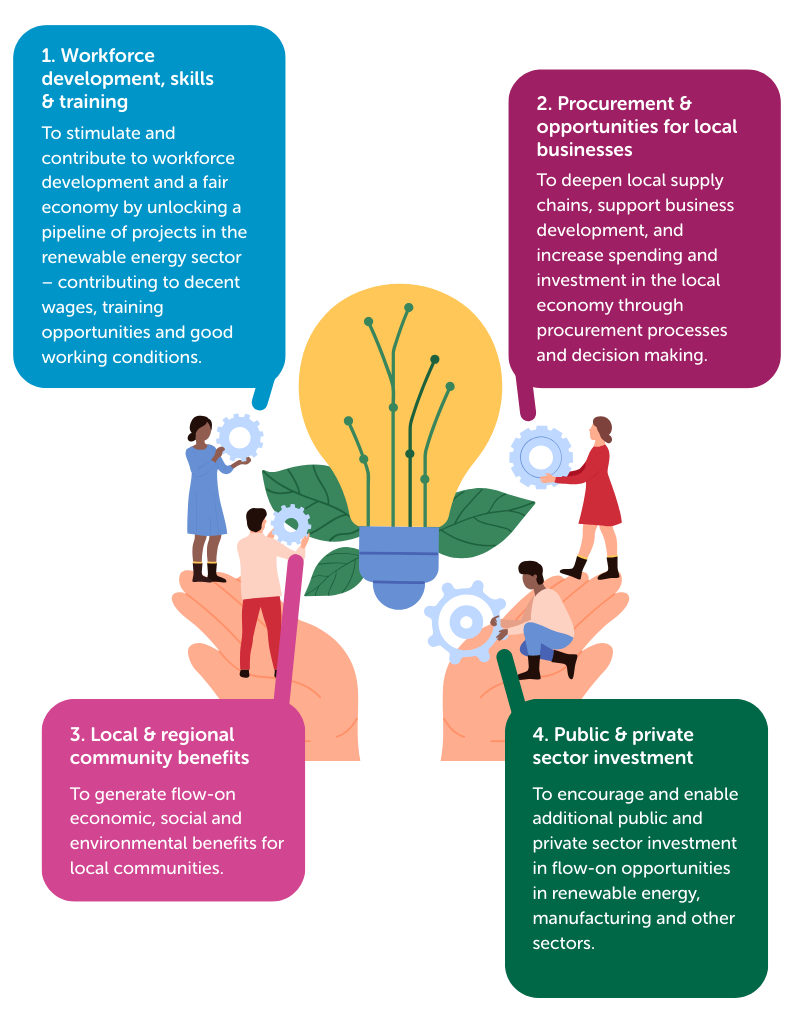Economic Development
Published in August 2022 and updated in May 2025, the NWTD Economic Development Regional Action Plan (the Plan) outlines economic opportunities from Project Marinus and renewable energy developments in Tasmania’s north west. The opportunities and actions captured in the Plan reflect the priorities that were expressed by local stakeholders at the time.
At the start of 2025, TasNetworks engaged Summit Strategy to undertake an independent assessment of TasNetworks’ progression of the Plan. Opportunities were identified to refine the Plan to ensure it is fit for purpose for the next phase of the NWTD project.
Theme areas identified
The 2022 Plan identified economic development benefits across five theme areas. These have since been consolidated into four core themes in the updated Plan to streamline the framework and better reflect the nature and intent of the benefits. Specifically, Theme 3: Infrastructure, Assets and Market Benefits has been removed on the basis that these benefits are primarily outcomes of the NWTD project itself, rather than distinct areas for economic development intervention. The balance of the associated opportunities and actions have been incorporated into the most appropriate remaining themes, particularly Theme 4: Local and Regional Community (Social) Benefits and Theme 5: Public and Private Sector Investment.
The four updated theme areas include:

Challenges identified for large-scale renewable energy projects in the region
As part of the assessment, key stakeholders were engaged to provide valuable feedback. The insights from stakeholders, summarised below, reflect the challenges in progressing large-scale renewable energy projects in the region:
-
Workforce development, skills & training
The region is underprepared for major renewable energy projects due to missed opportunities in workforce development, a shortage of skilled labour, poor coordination, and unclear career pathways - factors that risk overreliance on interstate workers and reduced local employment outcomes.
-
Procurement / local content
There has been a lack of early, clear engagement with local businesses, leaving subject matter experts uncertain about opportunities and unprepared due to limited information on work packages, unknown capability gaps, and minimal face-to-face outreach – though interest is growing with the appointment of a head contractor for NWTD.
-
Community
Communities don’t fully understand the potential impacts and benefits of the project. Accommodation and services for interstate workers are limited and likely to face pressure during construction. This presents a unique opportunity to leave a lasting economic legacy through housing and community investments.
-
Leadership / governance
Despite awareness of workforce and housing challenges, progress in this area has stalled due to complex planning, and a lack of coordination and accountability. While goodwill exists, action is limited, and there is no central body driving delivery. Simplifying strategies and learning from past projects are critical to preparing the region.
-
Engagement / narrative
There is a perceived lack of positive narrative around the broader benefits of renewable energy projects. The business community is experiencing fatigue and a lack of preparedness driven by uncertainty. These challenges highlight the urgent need for clear, consistent promotion of the broader economic and community value of renewable energy projects.
Stage 1 construction is due to commence in 2026 and to be completed in 2029-30. Accordingly, the actions, timing, and measures within the updated Plan are for the three-year period from 2026 to 2029. However, longer term opportunities and actions have been identified and included for the benefit of future periods.
